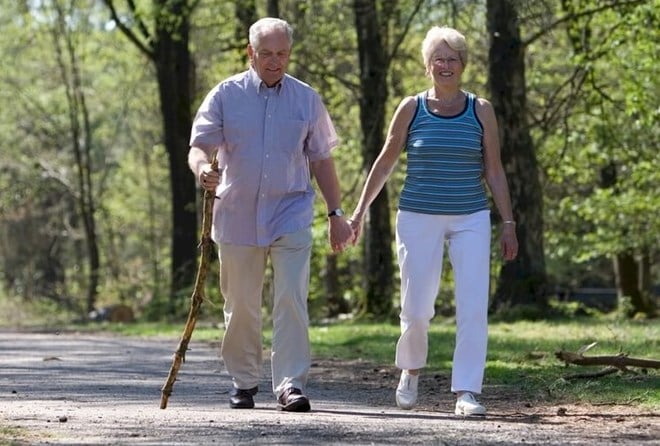
Walking is one of the simplest and most effective forms of exercise, especially for the elderly. Walking not only improves cardiovascular and bone health, but also increases endurance and mental strength.
However, to get the maximum benefits from walking, the elderly need to know how to walk safely. Accordingly, experts from the health website Healthline have pointed out some basic ways for walking to be effective.
Health Check
Before starting any new exercise program, seniors should have a general health check-up and consult with their doctor to ensure that they are best able to participate in running. Do not ignore the assessment from your doctor to choose the right exercises for each individual.
Start
Warming up is an important step to help your body get used to the exercise and reduce the risk of injury. Seniors should spend at least 5-10 minutes warming up gently before starting to walk. Warm-up exercises can include rotating your wrists, ankles, shoulders and knees, along with some gentle stretching.
Speed up
To safely increase walking speed, seniors should start at a slow pace and gradually increase their speed. This will help the body adapt well and reduce the risk of injury. Accordingly, some suggestions for speed-increasing plans that can be applied include:
Weeks 1-2: Walk at a normal pace, focusing on maintaining proper walking and breathing.
Week 3-4: Increase your walking speed gently, each time you walk about 5-10% faster than the previous week.
Week 5 onwards: Continue to increase your walking speed in stages that suit your body, keeping the same speed for a few days to let your body adapt before continuing to increase it.
Maintain correct posture
Correct walking posture not only increases the effectiveness of exercise but also reduces the risk of injury. Elderly people should keep their back straight, not hunched or bent. Eyes should look straight ahead, not bent neck. Relax the shoulders and arms, keep the arms slightly bent and swing naturally with the rhythm of the steps.
Listen to your body
When increasing walking speed, seniors need to listen to their bodies. If they feel tired, sore or short of breath, slow down or stop to rest. Listening to your body will help prevent injury, and you should never try to overdo it.
Nutrition
To support the training process, the elderly should maintain a balanced and reasonable diet. Supplementing enough nutrients such as protein, vitamins, minerals and water helps the body recover better after each training session.
Source: https://laodong.vn/suc-khoe/di-bo-dung-cach-danh-cho-nguoi-cao-tuoi-1360594.ldo



















































![[Maritime News] More than 80% of global container shipping capacity is in the hands of MSC and major shipping alliances](https://vphoto.vietnam.vn/thumb/402x226/vietnam/resource/IMAGE/2025/7/16/6b4d586c984b4cbf8c5680352b9eaeb0)













































Comment (0)